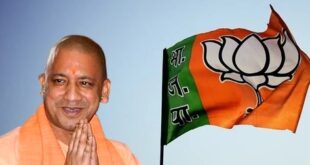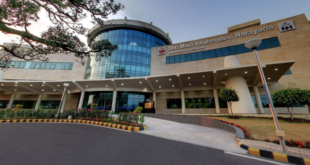 Yogendra Yadav
Yogendra Yadav
AAP cries wolf against the central government all the time. But we must remain alert when the wolf actually arrives.
My phone started ringing as soon as the news of Manish Sisodia’s arrest flashed. TV channels were extra keen on my byte. Given my history with the Aam Aadmi Party, they assumed that I would join the campaign seeking his resignation. Once he resigned, they assumed that I would join the well-orchestrated chorus about the moral and political fall of AAP. They were looking for a masala byte: ‘AAP founder castigates the party for moral degeneration’, or something along those lines.
I did not oblige. I am no fan of AAP or Manish Sisodia, I said, but I cannot possibly applaud or enjoy Sisodia’s arrest. First and foremost, I must condemn this arrest and the political drama surrounding it.
Over the last eight years after exiting AAP, I have tried not to spend disproportionate time and energy on critiquing my ex-colleagues. Once in a while, the situation forces me to respond, but I move on quickly. I find kiss-and-tell politics too boring. Besides, you can’t allow your ex to control your present life.

In this case, there was also a different and deeper reason for my response, not limited to my personal and political predilections. Focusing our attention and energies at this moment on the excise scam of AAP reflects a poor political judgment. It involves stepping into a well-laid diversionary trap. It amounts to politics of false moral equivalence that allows a run-of-the-mill scam to distract us from the biggest scandal of our time. It leads us to unwitting complicity in political hypocrisy and witch-hunt.
Why AAP’s excise policy stinks
An honest response to this situation need not brush aside the issue of excise policy or rush to give clean chit to AAP leaders. Sadly, this is what most opposition leaders have done while rightly condemning the arrest and detention of Manish Sisodia. A simple-minded partisanship has overtaken principles in our public life. If you are with the BJP, or if your dislike for AAP overwhelms your opposition to the BJP, you believe the CBI charges, support Sisodia’s arrest and forecast a death for the AAP. If you are opposed to the current dispensation, you stand with AAP, give a clear chit to Sisodia, condemn his arrest and believe that the entire case is a fabrication. Political judgments need not be so innocent.
First of all, liquor policy is a serious business. I have argued in this column that liquor control is not about moral policing of a private pleasure. It is a grave issue involving high mortality, violence against women and economic distress of poor families. There is also no doubt that far from fulfilling its promise in its very first manifesto of reducing liquor consumption, the AAP government has, like all state governments, worked towards enhancing liquor consumption and revenues. It so happens that my organisation, Swaraj Abhiyan, was the first to start a public campaign against the AAP government’s boost to liquor vends, way back in 2016. Their excise policy stinks.
More to the point, it seems that the present liquor scam case is no figment of an opponent’s imagination. Prima facie there is something disturbing here: a major overhauling of excise policy that does not seem to serve any public purpose. There are just too many details – paper-trails, leaks, handsets, touts – to fit into the story of a god-fearing leader working tirelessly to serve the people. It is for the investigating agencies and courts to see if the available evidence can sustain the charge of quid pro quo. But this is not one of those fanciful horror stories — the conspiracy case against CAA protesters, for example — that this government usually weaves against its opponents. Those who have seen the amount of money the AAP has poured into the recent elections and have wondered about its source cannot take the present case lightly.
Yet, all this does not justify the actions of the central government.
Don’t miss the basic question
There are three questions that must be asked: Was it necessary to arrest Manish Sisodia? Is his arrest justified by the standards adopted by the present government in similar cases? Does the timing of this case serve some other sinister political purpose? These are not issues of legality. When a judge grants remand and the Supreme Court refuses to intervene, they are only drawing an outer legal boundary. They are only saying that Manish Sisodia’s detention is legally permissible. That does not resolve the substantive issue of political ethic, of whether the CBI was right in doing so. That must be debated.
I am no lawyer. But I am pretty sure that the law of the land does not require the investigating agency to arrest an accused in every such case, however strong the corruption charges may be. The CBI had already raided Manish Sisodia’s premises and recovered what they wanted. So there was no danger of destruction of evidence. Nor was there an issue of the imminent disappearance of a Deputy CM. As for his alleged non-cooperation during interrogation, it is unclear how police detention would help matters, unless the CBI is asking for permission to use third-degree methods. If the CBI was serious about corruption, all it needed to do was question Sisodia as often as it needed to, gather all other evidence, present the case to the court, secure his conviction, and put him behind bars. Arrest at this stage couldn’t possibly be anything but a political theatre so as to send a message to all the leaders of opposition. This would lead anyone to suspect that other motives were at work in this arrest on a Sunday, coinciding with Rahul Gandhi’s speech at Congress plenary.
This suspicion is strengthened if you look at the record of the CBI and other investigative agencies in the recent past. Over the last few years, while the number of cases has gone up multi-fold, the proportion of the ruling party leaders under the scanner has come down to a negligible number. Those political leaders who were under the scanner suddenly disappear from the radar once they switch to the BJP. Not to put too fine a point on it, no one in this country can now accuse the CBI of doing its job. We are all so accustomed to these agencies carrying out political vendetta on behalf of their political masters that we now forget to call it out. We no longer ask the basic question: Is it alright to target political opponents by misusing institutions of criminal justice? Is it acceptable to not allow any opposition party-led state government to perform its constitutional functions? The opposition did the right thing by asking these questions and condemning the arrest.
Just last week, Reporters Collective did an expose of the coal mine allocation scam under the Modi government, not dissimilar to the infamous cases under the UPA. Should we expect a CBI inquiry? Any arrests? If the standards applied to Manish Sisodia were to be applied uniformly, how many ministers in the central government should be behind the bars? Would the CBI interrogate the SEBI chief for turning a blind eye to serious charges of stock market manipulation by Adani group of companies? Or the heads of LIC or the SBI for risking ordinary peoples’ hard earned money to support Adani? This is not whataboutery, but a reminder that these agencies must be expected to follow uniform norms.
That brings me to the final point. Is it a mere coincidence that this case of AAP’s corruption occupies national centre stage at a point when the country is faced with arguably the biggest scam involving the (erstwhile) richest business man and the most powerful political leader? It would be utterly naïve, if not downright foolish, not to notice the attempt to cover up the national scandal of a gigantic heist with an orchestrated chorus over a theft.
It is tempting to draw vicarious pleasure from the sight of sanctimonious anti-corruption crusaders facing serious corruption charges. But we must resist this temptation. AAP cries wolf against the central government all the time. But we must remain alert when the wolf actually arrives. Politics is about taking a stand in the midst of multiple wrongs of different scales. Political judgment is about not losing our sense of proportion and a clear-eyed view of the big picture.
 Jubilee Post News & Views
Jubilee Post News & Views




